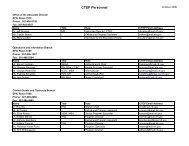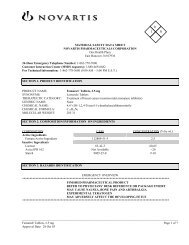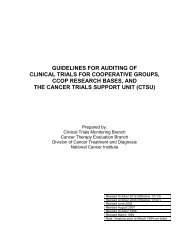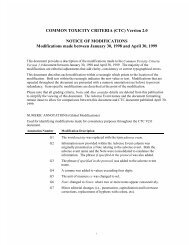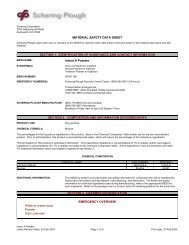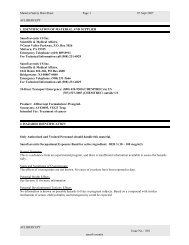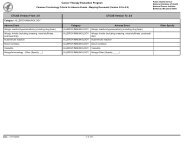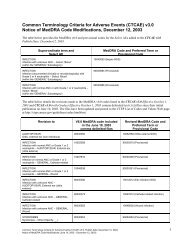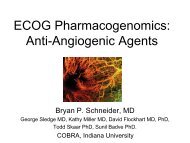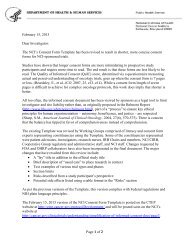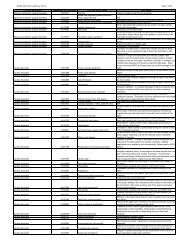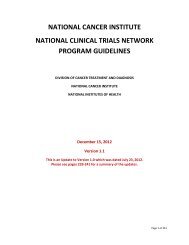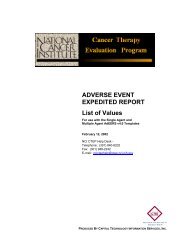ctep, nci guidelines: adverse event reporting requirements - Cancer ...
ctep, nci guidelines: adverse event reporting requirements - Cancer ...
ctep, nci guidelines: adverse event reporting requirements - Cancer ...
Create successful ePaper yourself
Turn your PDF publications into a flip-book with our unique Google optimized e-Paper software.
CTEP, NCI Guidelines: Adverse Event Reporting Requirements<br />
2.8.2 Agent Specific Adverse Event List (ASAEL)<br />
The ASAEL is a subset of AEs within the CAEPR. This subset contains <strong>event</strong>s that are<br />
considered expected for expedited <strong>reporting</strong> <strong>requirements</strong> only. As the ASAEL is updated, the<br />
revised versions are sent to all Pri<strong>nci</strong>pal Investigators registered to protocols using the agent. A<br />
current version of the ASAEL may also be obtained via e-mail from AdEERSMD@tech-res.com.<br />
2.8.3 Expected Adverse Event (for Expedited Reporting Purposes for<br />
Agents under a CTEP IND)<br />
‘Expected’ AEs for expedited <strong>reporting</strong> purposes only are listed in the ASAEL (a subset of the<br />
CAEPR).<br />
2.8.4 Expected Adverse Event (for Expedited Reporting Purposes for<br />
non-CTEP IND Agents)<br />
The determination of whether an AE is expected for commercial agents is based on available<br />
sources including the package insert and/or the Investigator’s Brochure. AdEERS is not<br />
programmed to guide the reporter about expectedness for commercial agents.<br />
2.8.5 Unexpected Adverse Event (for Expedited Reporting Purposes<br />
for Agents under a CTEP IND)<br />
‘Unexpected’ AEs are those not listed in the ASAEL.<br />
2.8.6 Unexpected Adverse Event (for Expedited Reporting Purposes<br />
for non-CTEP IND Agents)<br />
Unexpected AEs for commercial agents are those not listed on available sources including the<br />
package insert, the Investigator’s Brochure, or the protocol.<br />
2.9 Attribution<br />
The determination of whether an AE is related to medical treatment or procedure.<br />
CTC/CTCAE do not define an AE as necessarily ‘caused by a therapeutic intervention.’ The<br />
clinical investigator must assign attribution for an <strong>adverse</strong> <strong>event</strong> after naming and grading of the<br />
<strong>event</strong>.<br />
Adverse Event Attribution Categories:<br />
Attribution Description<br />
Unrelated The AE is clearly NOT related to the intervention<br />
Unlikely The AE is doubtfully related to the intervention<br />
Possible The AE may be related to the intervention<br />
Probable The AE is likely related to the intervention<br />
Definite The AE is clearly related to the intervention<br />
December 15, 2004 5



